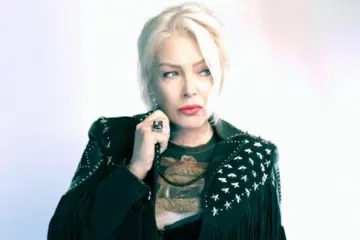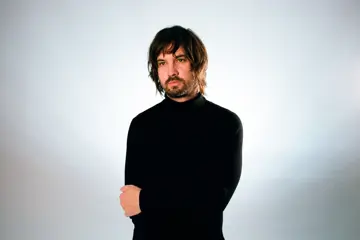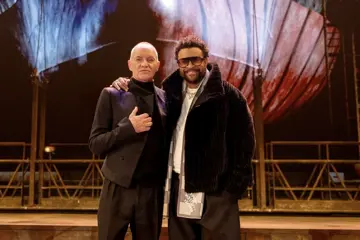2012 has been a year of surprises for Jon Toogood. In a funny way, a year of betrayals. Toogood's work with Shihad has been characterised by an almost antagonistic relationship with his own legacy as a musician. While they're perhaps best known these days for their brief flirtation with mainstream rock stardom in the early-noughties (i.e. their American Pacifier years), Shihad's career has been an almost constant evolutionary arc.
They began in the late-'80s as a speed-metal band – even today, Toogood remains a committed Slayer fan. Since then, they've navigated through versions of post-punk, noise-rock, electronica, pop, industrial and indie-rock. Their last three albums alone have seen them shift from hard rock (2005's Love Is The New Hate) through to shimmering electro-pop (2008's Beautiful Machine) into experimental noise-rock (2010's Ignite).
“None of us have ever really had any interest in just sitting on our ass and reflecting about shit,” Toogood says of the band's approach. “It's always been about, 'What's the next record? What are we going to do for the next album?' You know, it's one of the reasons we're still a band after twenty years. We're all still really excited and interested to see what we're going to do next as a band.”
So, it's been somewhat surprising to see Shihad deliver a 'greatest hits' compilation. Not just a contractually obligated handful of singles, either – but a fully-crafted and curated double-disc of the band's most interesting moments over the past 24 years. The Meanest Hits spans from the band's debut 1990 EP Devolve through to Ignite and even new single Right Outta Nowhere. It's beyond comprehensive.
Don't miss a beat with our FREE daily newsletter
“The record company's been at us every two years for, oh, probably the past decade,” Toogood laughs. “After every album, they'd hit us up with the idea for a greatest hits compilation and, every single time, we'd knock them back with some excuse. Same conversation every time; 'Maybe you could do a greatest hits compilation?' 'Yeah, yeah – nah, we're going to make another album instead!'”
Funnily enough, it was a series of similarly retrospective endeavours that actually convinced the band. In 2010, for example, they toured both New Zealand and Australia performing their two most celebrated albums (1995's Killjoy and 1999's The General Electric) live in their entirety. 2012, meanwhile, has seen the band become the subject of their own critically-acclaimed documentary – Beautiful Machine.
Directed by award-winning filmmaker Sam Peacocke, Beautiful Machine traces Shihad's legend from their high school formation in 1988 through their early breakthroughs in the mid-'90s (touring with Faith No More, praise from Metallica), their ill-fated sojourn to the United States (wherein they famously changed their name to Pacifier in the wake of September 11) and through to their current position as New Zealand rock legends.
“That movie coming out was very weird,” Toogood says. “You know, it was made over the past two or three years and a lot has happened in that time. My dad passed away earlier this year and he's in the movie and that was just full on. The whole thing was full on for me on heaps of levels, actually. It's just brutal. There's things on there of stuff I said when I was nineteen, twenty and it's just, 'Oooooh...What a dick!'
“But, that's kind of what makes it good. I went to the premier with my mum and Andy Serkis was sitting behind me and, some of the stuff I was saying, I was like, 'Oh, fuck, Gollum's hearing me say this shit! And some of the All Blacks',” he laughs. “But, at the end, they all came up to me and went, 'Fucking great movie!' and it actually really is as if it's not you. It's a great film even if you've never even heard of our band. It's just embarrassing.”
Through forcing Toogood and the rest of the band to revisit their output (in considerable detail), Sam Peacocke inadvertently influenced Shihad's decision to actually finally release a greatest hits album. One gets the feeling that Toogood otherwise would have never thought his band's older work good enough for such a compilation. It was only when he was effectively forced to listen to his older albums that it started to make sense.
“The movie was definitely the inspiration for actually hearing out the record company,” he says. “When you're faced with all the questions that the movie faces you with, you have to reflect. You have to look back at where you've come from. It was actually surprisingly pleasant. You know, there were a lot of moments of, 'Oh, we were actually onto something there'. There were good bits and bad bits but there was definitely enough there.
“You know, enough there for me to go, 'Oh, fuck it, why not?' at least,” the frontman laughs. “But we were determined to make sure it was the songs that meant something to us. Not just the singles or the hits. Some songs we never even released as singles are some of our kind of definitive Shihad songs. Luckily, we were given pretty much free licence to define what was and wasn't an essential Shihad track.”
The band's uncharacteristic nostalgia, meanwhile, has led to what a younger Jon Toogood may have considered the greatest betrayal of all – a renewed working relationship with notoriously unpredictable Killing Joke frontman, composer and producer Jaz Coleman. After completing their current tour cycle, Shihad will (theoretically) travel to Egypt with Coleman to record their next album.
It's a startling move for a number of reasons. Coleman having produced Shihad's 1993 debut album Churn, it represents an atypically regressive move. More importantly, Shihad fell out with Coleman rather publicly not long after the release of Churn. Silvercup, from Killjoy, was written about the dispute. It would seem, even in reflection and nostalgia, Shihad will continue to surprise.
“Oh, I did not talk to him for years. Like, years,” Toogood says of the band's relationship with the frontman – who made headlines again recently when his own band couldn't locate him in time for a tour (he was eventually found in the East Sahara desert). “We were all working in music retail back then and, after he pissed off to England after the sessions for our first album, we asked him if we wanted to produce our second, Killjoy.
“He said he couldn't do it, so we did it ourselves. He came back and went, 'Hold on, I was supposed to produce that record, give me five thousand dollars!'” he laughs. “That may not seem like much now but, at the time, we all had to put aside money from our wages until we paid him off. Still, he came to us, said, 'Let's go to Egypt, it's all in political turmoil, let's go to the heart of it and record a heavy as fuck record!'
“And, man, honestly. All that happened a long time ago – and that sounded fucking exciting to me!”
Shihad will be playing the following shows:
Thursday 6 September - The Hi-Fi, Melbourne VIC
Friday 7 September - Metro Theatre, Sydney NSW
Saturday 8 September - The Hi-Fi, Brisbane QLD
Thursday 27 September - The Gov, Adelaide SA
Friday 28 September - Amplifier, Perth WA
Saturday 29 September - Waverock Weekender, Hyden WA
Sunday 30 September - Mojos Bar, Freemantle WA















